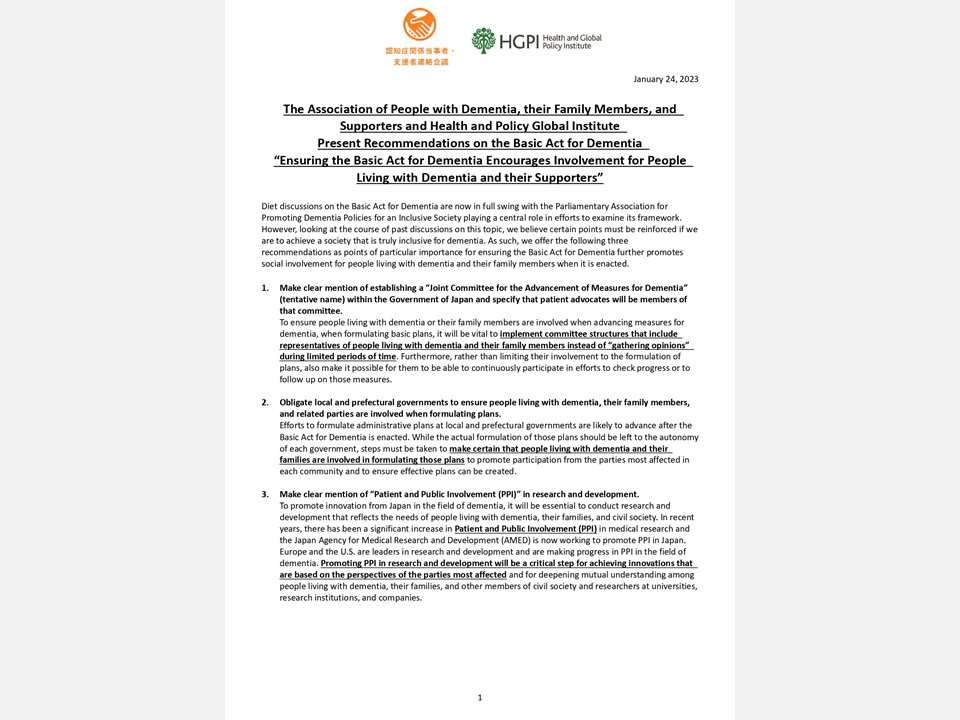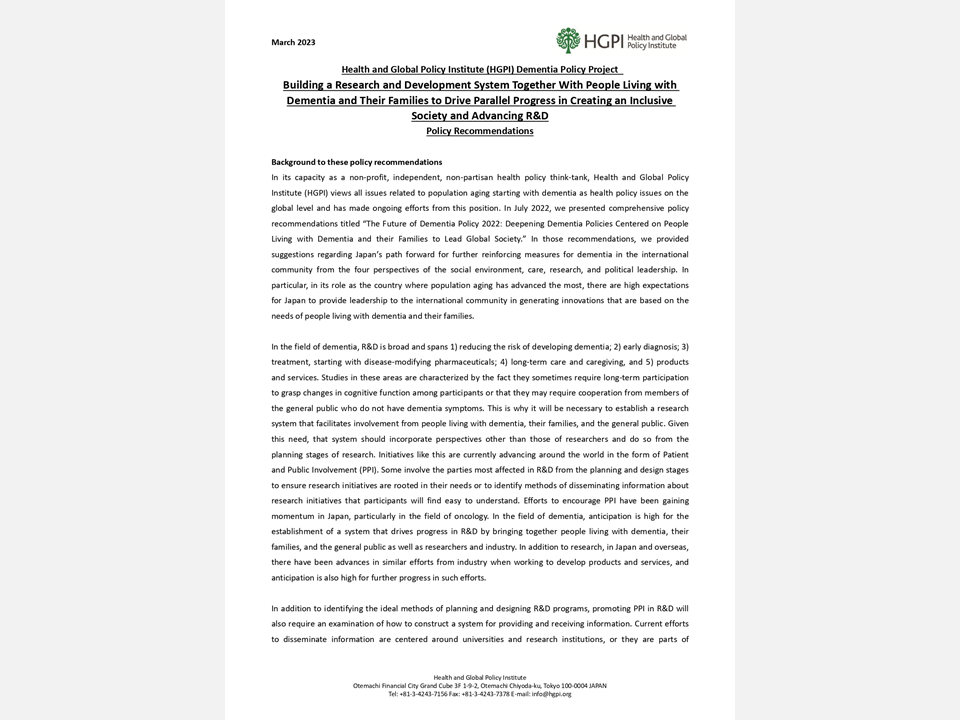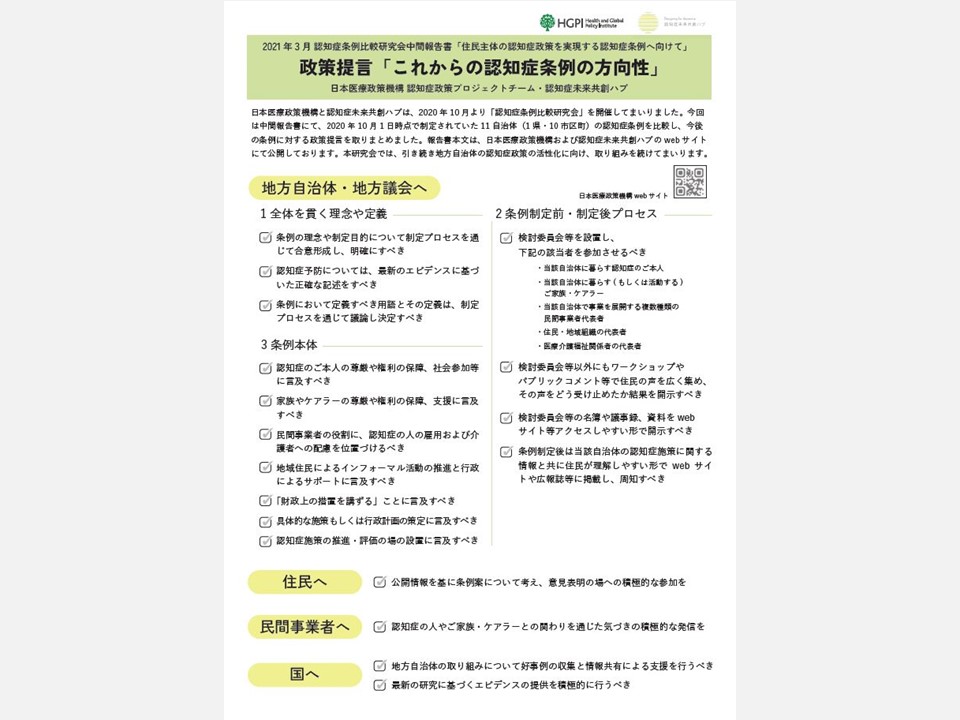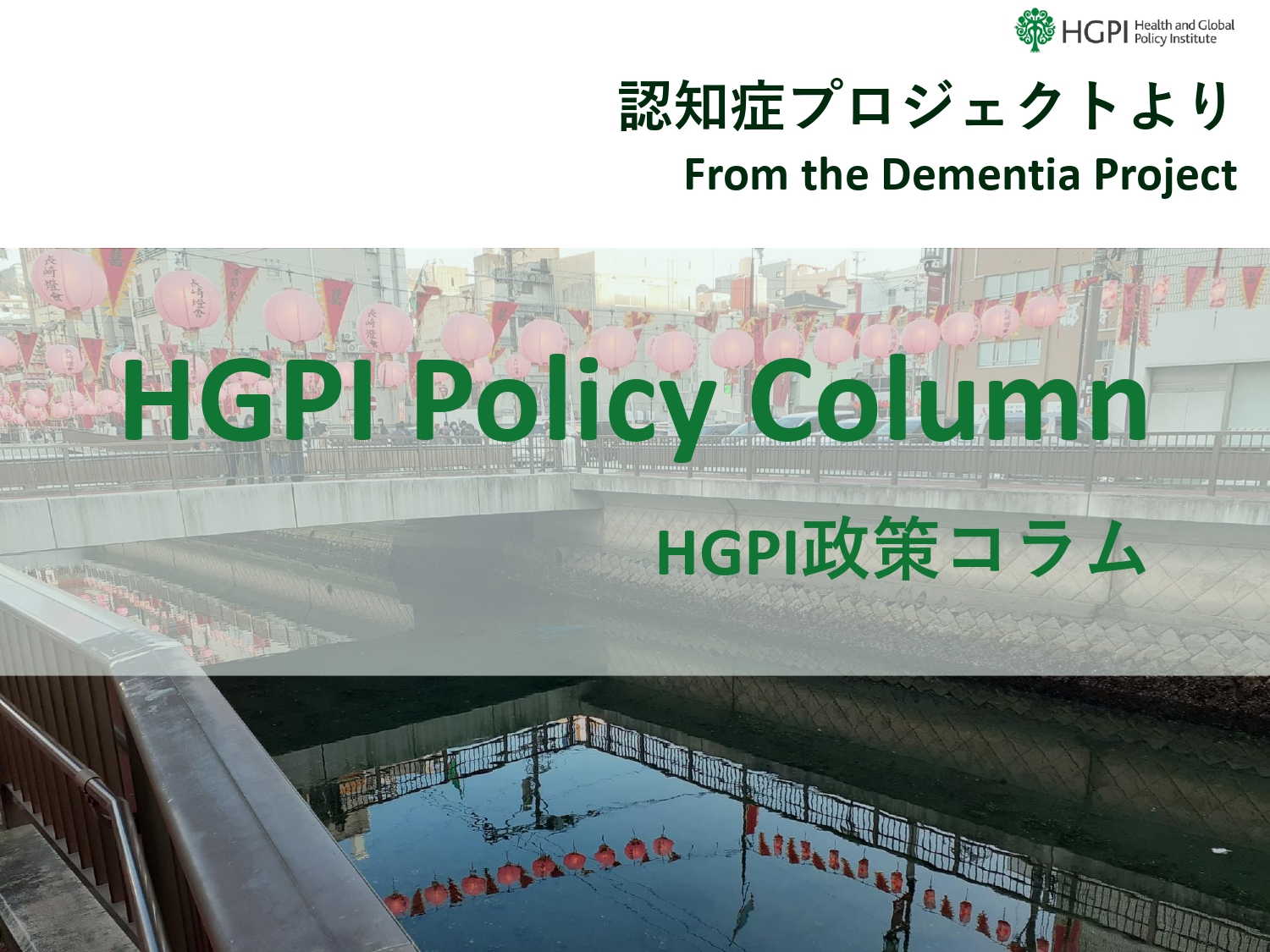[HGPI Policy Column] (No.50) From the Dementia Project ”The Basic Plan and the New Perception of Dementia”
date : 12/3/2024
Tags: Dementia, HGPI Policy Column
![[HGPI Policy Column] (No.50) From the Dementia Project ”The Basic Plan and the New Perception of Dementia”](https://hgpi.org/en/wp-content/uploads/sites/2/HGPI_20241203_column-No.50.jpg)
<POINTS>
- The Basic Plan on Dementia to Promote an Inclusive Society was approved by the Cabinet on December 3, 2024 and will be in effect for approximately five years, until FY2029.
- The Basic Plan is centered on a “new perception of dementia” and outlines the twelve basic measures set forth in the Basic Act on Dementia in more concrete terms. It also sets four Priority Goals to be evaluated along three axes: process indicators, output indicators, and outcome indicators.
- Prefectural and municipal governments have been obligated to endeavor to formulate their own plans for the promotion of dementia policies and are likely to do so in the future. We recommend they formulate local ordinances for dementia as a preliminary step in this process.
Key points of the Basic Plan on Dementia to Promote an Inclusive Society
The Cabinet approved the Basic Plan on Dementia to Promote an Inclusive Society (hereinafter, the “Basic Plan”) on December 3, 2024, and its first phase has now begun. It is set to be in effect for approximately five years, until FY2029. The Basic Plan was formulated in accordance with Article 11 of the Basic Act on Dementia to Promote an Inclusive Society (the “Basic Act on Dementia”), which came into effect on January 1, 2024.
The Basic Plan includes specific measures for the twelve basic policies set forth in the Basic Act on Dementia, which cover deepening public understanding, removing barriers, ensuring social participation, providing healthcare and welfare provision systems, and conducting research. It also includes four Priority Goals for the first phase, which cover: (1) understanding a “new perception of dementia;” (2) respecting the will of people living with dementia; (3) ensuring people living with dementia, their families, and other parties close to them can live in their communities with peace of mind; and (4) utilizing new knowledge and technology.
One major change in the Basic Plan from past measures is that instead of simply setting numerical output targets to establish goals, it establishes individual process indicators, output indicators, and outcome indicators, describes which processes each measure or initiative is based on, and outlines the intended impact for those initiatives to have on society after their implementation. For example, the outcome indicator for Priority Goal 1 reads, “Status of understanding of the ‘new perception of dementia’ among citizens and behaviors that reflect said understanding.” While this will be extremely difficult to manage in numerical terms, we recognize it as a necessary inclusion to describe the attitude to be fostered through the policies that are implemented.
Policy evaluation is likely to become a topic of discussion in the future. How should we measure the impacts of individual measures and initiatives? Regarding how to best evaluate these measures, rather than managing these effects numerically and in a centralized manner, they should be evaluated in a multifaceted manner that emphasizes the narratives of affected parties. I also think such evaluations should be performed in forums where those most affected can be involved, particularly meetings of the Stakeholder Committee for the Promotion of Policies for Dementia.
Promoting the meaningful involvement of people living with dementia and their families in research
Priority Goal 4 is, “Citizens can make effective use of new knowledge and technologies related to dementia.” Its indicators include, “The opinions of people living with dementia, their families, and other related parties are reflected in research (that is supported or conducted by the Government).” Specifically, its process indicators include “The number of research plans reflecting said opinions” while its output indicators include “The number of research projects reflecting said opinions.” No mention is made of reflecting said opinions in outcome indicators.
This goal is related to a concept known as “Patient and Public Involvement,” or PPI. Health and Global Policy Institute (HGPI) has been a steadfast proponent for this theme, and has presented policy recommendations on meaningful involvement in the formulation process for the Basic Act on Dementia titled, “Ensuring the Basic Act for Dementia Encourages Involvement for People Living with Dementia and their Supporters.” We also advocated for the establishment of a collaborative platform for driving innovation in the area of dementia and centered on civil society in recommendations presented in April 2023 titled, “Building a Research and Development System Together With People Living with Dementia and Their Families to Drive Parallel Progress in Creating an Inclusive Society and Advancing R&D.”
In Japan, the idea of researchers and patients collaborating in medical research is still an unfamiliar concept. However, collaborative research initiatives have been advancing in countries like England, Scotland, Canada, and Australia, and expectations are high for Japan to learn from examples from overseas and develop the best methods of advancing such research in Japan. HGPI will also focus on this theme in the future.
What’s “new” about the “new perception of dementia”?
The main theme of the recently-approved Basic Plan is “a new perception of dementia.” It aims to establish this new perception through the Priority Goals described above and also provides a detailed description of it in its preamble:
“The ‘new perception of dementia’ is the idea that people do not lose the ability to take action after developing dementia; rather, it posits that there are actions that each and every person wants to and can take in their capacity as an individual, even if they develop dementia, and that each person can continue living with hope and in a manner that is true to them, in familiar settings, and while staying connected to those close to them.
(Provisional translation; Basic Plan, p. 6)
Below, we will examine how this concept has been expressed in past plans and take a brief look at what exactly is new about it. (As official English translations of the documents referenced below have not been presented, the following quotes are provisional translations provided by HGPI.)
“Direction of Future Policies for Dementia*” (2012)
*This report served as the basis for the Five-Year Plan for the Promotion of Dementia Measures (the Orange Plan)
“This project aims to reform the idea that ‘People living with dementia have no choice but to use psychiatric hospitals and facilities’ to ‘Make society a place where people’s right to make their own choices is upheld, even if they develop dementia, and where they can continue living in good environments and familiar communities as long as possible.’” (p. 2-3)
“The Comprehensive Strategy to Accelerate Dementia Measures (the New Orange Plan)”(2015)
“…the aim is to make society a place where the right of people living with dementia to make their own choices is upheld and they can continue living true to themselves in good environments and familiar communities as long as possible…” (p.8)“The National Framework for Promotion of Dementia Policies” (2019)
“…the aim is to make society a place where people can continue living true to themselves and with dignity in familiar communities, even if they face difficulties in everyday life. This will be accomplished by preventing the progression of the condition and obtaining understanding and cooperation from those around them and their communities to minimize difficulties and to enable affected parties to maintain a positive outlook while making the most of their abilities…” (From the explanation of “inclusion” on p.3)
Placing them side by side, we can see there have been some changes in these texts, but items such as the autonomy of those most affected or their ability to be able to continue living in familiar communities have been included since 2012 without major changes. However, I feel that there is great significance in the words “each and every person…in their capacity as an individual,” which first appeared in the Basic Plan.
These words are in line with the definition of “an inclusive society” provided in Article 1 of the Basic Act on Dementia, which is, “a vibrant society in which each person, including those with dementia, can fully realize their individuality and abilities, and live in an inclusive and mutually-supportive social environment with others while respecting each person’s character and individuality.” I think this definition provides a glimpse of the premise of the new perception of dementia, which is that each person living with dementia is an individual, rather than viewing people living with dementia as a group.
While it goes without saying, I think that these changes were driven by messages from those affected by dementia, especially people living with dementia themselves. For example, recommendations presented by the Japan Dementia Working Group (JDWG) in February 2023 titled, “Drafting the Basic Act on Dementia for an Inclusive Society: Expectations and Requests for a Future-Oriented Basic Act for Better Coexistence” advocates for respecting the individual, stating, “‘Dementia’ is a collective term for a condition triggered by an enormous number of diseases that result in difficulties to everyday life, and those of us who live with dementia live our lives and walk our own paths along countless different routes.” After the Basic Act on Dementia was enacted, the government hosted the “Council for the Realization of a Happy Aging Society That Faces Dementia,” where a frequent topic of discussion was shifting the perceptions of dementia. It is easy to imagine that the recently-enacted Basic Plan was informed by these discussions.
Conclusion
This column discussed the Basic Plan on Dementia to Promote an Inclusive Society recently approved by the Cabinet and its key message, which is “a new perception of dementia.” Moving forward, domestic dementia policies will be developed in accordance with this Basic Plan, and plans for the promotion of dementia measures that the Basic Plan obligates prefectural and municipal governments to endeavor to formulate will be of particular importance.
In 2021, HGPI published an Interim Report and Recommendations of the Comparative Research Group on Local Regulations for Dementia titled, “Steps Toward Regulations for Dementia That Achieve Citizen-Centered Dementia Policy.” In the near future, we plan to present an updated version of that report with our latest findings. We have high expectations that the enactment of local regulations will guide dementia policies in each city without influence from city leaders, council circumstances, or how related departments are structured at the time of their formulation. Through the formulation of those ordinances, I would like for each city to convey what they can call “Our city’s dementia policy” in terms that are based on the new perception of dementia.
Author
Shunichiro Kurita (Senior Manager, HGPI)
Top Research & Recommendations Posts
- [Research Report] Survey of Japanese Nursing Professionals Regarding Climate Change and Health (Final Version) (November 14, 2024)
- [Policy Recommendations] Developing a National Health and Climate Strategy for Japan (June 26, 2024)
- [Research Report] Survey of Japanese Physicians Regarding Climate Change and Health (December 3, 2023)
- [Research Report] Building a Mental Health Program for Children and Measuring its Effectiveness (June 16, 2022)
- [Research Report] The 2023 Public Opinion Survey on Satisfaction in Healthcare in Japan and Healthcare Applications of Generative AI (January 11, 2024)
- [Announcement] A Turning Point Towards Building Green Healthcare Systems (June 5, 2024)
- [Research Report] 2019 Survey on Healthcare in Japan
- [Policy Recommendations] The Women’s Health Promotion Project “Policy proposal for Promotion of Menopausal Women’s Health as a Social Issue to be Considered by Industry, Government, Academia and the Private Sector” (July 31, 2024)
- [Announcement] Signs “A COP29 for People and Planet: Recommendations from the international health and climate community” (November 11, 2024)
- [Discussion Points] Women’s Health Project Expert Meeting “The Ideal System for Perinatal Medical Care in Japan in the Era of Declining Birth Rates” (November 11, 2024)
Featured Posts
-
2024-11-21
[Reserch Report] Antimicrobial Resistance (AMR) Measures in Sweden (November 21, 2024)
![[Reserch Report] Antimicrobial Resistance (AMR) Measures in Sweden (November 21, 2024)](https://hgpi.org/en/wp-content/uploads/sites/2/HGPI_20241002_AMR_Research-Report_Antibiotic-Smart-Sweden.jpg)
-
2024-11-25
[Registration Open] (Webinar) The 130th HGPI Seminar “Marking a Decade of the Act on Medical Care for Patients With Intractable Diseases: Connecting Intractable Diseases and Society From the Perspective of a Media Professional and Family Member” (January 28, 2025)
![[Registration Open] (Webinar) The 130th HGPI Seminar “Marking a Decade of the Act on Medical Care for Patients With Intractable Diseases: Connecting Intractable Diseases and Society From the Perspective of a Media Professional and Family Member” (January 28, 2025)](https://hgpi.org/en/wp-content/uploads/sites/2/The130thHGPI_Seminar_eyecatch-.png)
-
2024-11-29
[Registration Open] (Webinar) The 129th HGPI Seminar “The Connection Between Planetary Environment and Human Health as Seen Through the JECS and Future Expectations” (December 23, 2024)
![[Registration Open] (Webinar) The 129th HGPI Seminar “The Connection Between Planetary Environment and Human Health as Seen Through the JECS and Future Expectations” (December 23, 2024)](https://hgpi.org/en/wp-content/uploads/sites/2/hs129-top.png)
-
2024-12-01
[Activity Report] Announcing the Launch of the Japan’s Patient Expert Platform (J-PEP) Website (December 1, 2024)
![[Activity Report] Announcing the Launch of the Japan’s Patient Expert Platform (J-PEP) Website (December 1, 2024)](https://hgpi.org/en/wp-content/uploads/sites/2/00_J-PEP_launch_20241201_VerFinal.png)








